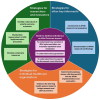Outcomes Evidence Must Keep Up with the Implementation of the 4Ms Framework to Ensure Age-Friendly Health System Transformation
- PMID: 40231623
- PMCID: PMC12033401
- DOI: 10.1177/00469580251334511
Outcomes Evidence Must Keep Up with the Implementation of the 4Ms Framework to Ensure Age-Friendly Health System Transformation
Abstract
The Age-Friendly Health System (AFHS) movement was conceptualized as a transformative solution to reliably deliver evidence-based care to older adults. Guided by the 4Ms framework: What Matters, Mobility, Mentation, and Medication, AFHS healthcare systems have been given the flexibility to tailor 4Ms interventions and care processes to their context, preferences and populations. This flexibility has facilitated the widespread adoption of 4Ms care. However, as our understanding of 4Ms implementation grows, evidence of the impact of 4Ms care on outcomes must keep up with implementation to ensure AFHS transformation. It is only through assessing the 4Ms as a whole and understanding the interplay between the Ms in relationship to outcomes that we can understand: (1) value-generation to-date, (2) how variation in 4Ms implementation can maximize equitable value realization, and (3) if, and how, to expand the framework most effectively. We propose seven strategies to catalyze the generation and dissemination of robust evidence to support AFHS transformation. These strategies are organized around activities that individual healthcare delivery organizations, researchers and evaluators, and other key informants can pursue. Expanding evidence generation and disseminating findings using these proposed strategies will support the 4Ms framework as an effective vehicle for improving health outcomes for older adults.
Keywords: age friendly health systems; aged; health; health services for the aged; health services research; outcomes assessment.
Conflict of interest statement
The author(s) declared no potential conflicts of interest with respect to the research, authorship, and/or publication of this article.
Figures
References
-
- Vepsa J, Medina L, Armstrong D. Demographic Turning Points for the United States: Population Projections for 2020 to 2060. Published online March 2018.
-
- Bureau UC. National Population Projections Tables: Main Series. Census.gov. Accessed October 11, 2024. 2023. https://www.census.gov/data/tables/2023/demo/popproj/2023-summary-tables...
-
- Meeting the Growing Demand for Age-Friendly Care: Health Care at the Crossroads ; 2024. https://www.johnahartford.org/images/uploads/resources/The_Growing_Deman...
-
- Age-Friendly Health Systems Recognition | Institute for Healthcare Improvement. Accessed October 11, 2024. https://www.ihi.org/age-friendly-health-systems-recognition
Publication types
MeSH terms
Grants and funding
LinkOut - more resources
Full Text Sources
Medical


